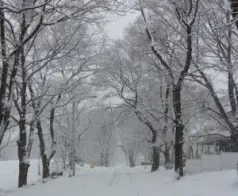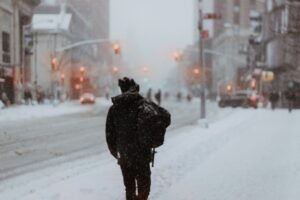
The Farmers’ Almanac is predicting that 2018 is going to be a very snowy year in Massachusetts. While that may be great news for snowboarders and snowmen-builders, it could be treacherous for residents just trying to get through it to run errands or visit a friend.
So what responsibilities do property owners have when it comes to clearing ice and snow from their properties? And how can residents keep themselves, and others, safe?
What Property Owners Have to Do with Snow
At one time in Massachusetts, property owners did not have to clear ice and snow from their properties unless it was considered an “unnatural accumulation.” Under this law, if a large amount of snow fell from a roof and created a hazard on a walkway or in a driveway, the property owner would have to remove it because it was an unnatural accumulation. But if snow and ice accumulated during the course of a regular snowfall, it would be considered a natural accumulation and the property owner would not be responsible for clearing it.
But that all changed in 2010. Mr. Emanuel Papadopoulos slipped and fell in a Target parking lot and sued the company. In the ruling, the court decided that “natural and unnatural” was vague and eventually those words were thrown out. Today, every property owner is responsible for clearing his or her property of ice and snow, even natural snowfall, to ensure everyone is kept safe.
This means that homeowners, homeowners’ associations, and property managers are all responsible for ensuring their properties are free of ice and snow. Homeowners’ associations usually include provisions in their bylaws stating that homeowners are responsible for clearing the ice and snow on property that only they have access to, such as in townhouse-style condominiums. If, however, the condominiums are in an apartment-style building, the property management company that cares for the common areas, such as the lobby and hallways, will likely hire a third-party contractor to clear the snow from walkways, parking lots, and other shared-use spaces.
This same idea applies to landlords. If the home is a single-family dwelling, the landlord will likely include in the lease that the tenant is responsible for clearing the snow. But if the home is an apartment in a multi-unit building, the landlord will likely hire a third-party contractor to clear the ice and snow.


Give us a call today to discover how we can assist you.
Ice and Snow Safety Tips
When clearing winter buildup, homeowners and tenants should remember to shovel off their roofs and decks to prevent leaks and cave-ins. Snow can get extremely heavy, especially after it builds up for some time, and you don’t want all that snow coming down on an unsuspecting person or vehicle.
But just because property owners are responsible for clearing snow doesn’t mean that pedestrians do not have to take care when walking across ice and snow. Massachusetts is a comparative negligence state—the injured person could be found partially responsible for his own injuries. If the plaintiff was 51% or more at fault for the accident, he could be denied compensation by the court altogether.
For this reason, everyone should take proper care when walking across ice and snow. Here are some tips:
- Wear proper footwear when outdoors. Boots with slip-resistant soles are best for winter weather.
- Be on the lookout for black ice, which forms after ice has melted and refrozen to form a thin layer of ice that’s difficult to see.
- When moving across ice, move slowly and deliberately, taking small steps.
- Practice extra caution when getting into vehicles and exiting them. Use the vehicle as extra support and balance.
- Beware of floors inside store entrances. As the snow from customers’ boots melts, it can make these floors particularly slippery.
- Do not carry large loads at one time. Your hands and arms can be used for balance, but only if they are free to move.
- Be patient and allow lots of time for getting to a destination.
Lastly, while it can be tempting for homeowners who have a garage to warm their car up in it, this is not advised. Noxious fumes can quickly fill a garage, even when the door is fully open, and that can cause carbon monoxide poisoning, which can result in death. It’s always best to open the garage door, start the car, immediately pull the car out of the space, and let it warm up in the open air of the driveway.
New Apps Make Snow Shoveling More Convenient
Ice and snow can be inconvenient, but also very dangerous. Property owners must work together to clear ice and snow to keep everyone safe. For those responsible for shoveling their own property who do not have the time or ability to do so, there are now snow-shoveling apps—Yeti and Shovler—that work like Lyft or Uber. A person can request snow removal through the app, and someone will come and clear the area for a price. Apps like these will make winter a little more bearable for those that can’t, or don’t want to, shovel themselves.
Though winter weather is an “act of nature,” people are still responsible for cleaning it up. If you were hurt on another person or business’s property because they didn’t clean it up, you may have a premises liability case. Icy slip-and-fall accidents, though funny in movies, are actually very painful and can change your life. For a free consultation with a Burlington attorney, call (781) 262-3338.


We are committed to providing valuable information and resources to assist you.




